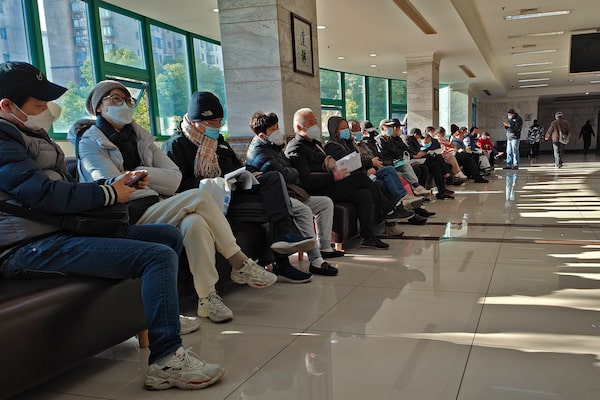
Family members of deceased wait for cremation procedures at a funeral home in Shanghai, China, on Jan. 4, 2023.The Associated Press
Around 60,000 people have died as a result of COVID-19 since China lifted its strict anti-pandemic regulations last month, the National Health Commission said Saturday.
The number of COVID-related deaths in hospitals totalled 59,938 between Dec. 8 and Jan. 12, officials from the country’s top health body said at a news conference. Of those, 5,503 fatalities were caused by respiratory failure. The remainder were caused by a combination of COVID-19 and other ailments.
This is the first time China has released an official death toll since pivoting away from zero-COVID late last year.
In the wake of that dramatic policy change, the NHC changed how it categorized COVID-19 deaths – to only count those involving respiratory failure – and shifted responsibility for reporting case figures to provincial authorities.
Opinion: China’s brutal COVID winter is just beginning
The Decibel: Why the surge of COVID in China looks a lot like 2020
While the authorities denied any intention to downplay the scale of the country’s outbreak, the reporting changes had the effect of doing just that, leading to criticism from the World Health Organization and foreign governments, many of which have placed restrictions or testing requirements on travellers from China.
“There are some very important information gaps that we are working with China to fill,” Dr. Maria Van Kerkhove, WHO technical lead on COVID-19, told a news conference on Wednesday. “WHO still believes that deaths are heavily under-reported from China and this is in relation to the definitions that are used but also the need for doctors and those reporting in the public health system to be encouraged to report these cases and not discouraged.”
The discrepancy between the official figures – with just a handful of deaths recorded per day even as mortuaries and funeral parlours faced long queues and many hospitals were overwhelmed – has led to increasing frustration and anger among many Chinese, still shell shocked by the sudden relaxing of restrictions that had been among the toughest in the world.
The average age among recent deaths was 80.3, the NHC said. Earlier this week, officials urged those travelling home for the Lunar New Year holiday, which begins on Jan. 21, to avoid elderly family members who may be at risk of infection.
Before China scrapped zero-COVID late last year, older people were woefully under-vaccinated, with just 42 per cent of over-80s having received three shots. Since the restrictions were lifted, there has been a concerted push to improve vaccine coverage, with the NHC saying that as of late December the number of people being vaccinated had more than doubled to 3.5 million per day.
The current wave of cases is cresting, NHC officials confirmed Saturday, and the worst has already passed in many areas, with medical affairs director Jiao Yahui saying nationwide “the number of fever clinic visitors is generally in a declining trend after peaking, both in cities and rural areas.”
Ms. Jiao added the number of emergency treatment patients was also declining and the ratio of patients who had tested positive for COVID-19 was steadily falling as well. The number of severe cases has also peaked, she said, though remained at a high level and patients were mostly elderly.
Even as the current wave subsides, officials in some areas of the country have warned that another will crest towards the end of the month, following the week-long Lunar New Year holiday. There are also concerns that particularly in rural areas, where health systems are already underdeveloped and at risk of being overwhelmed, those with little to no immunity may soon be exposed to the virus as large numbers of people arrive from outside the region.
With reports from Reuters and the Associated Press
 James Griffiths
James Griffiths